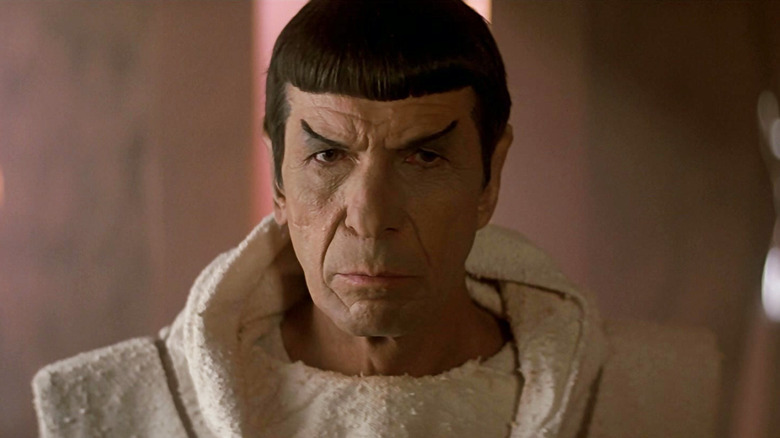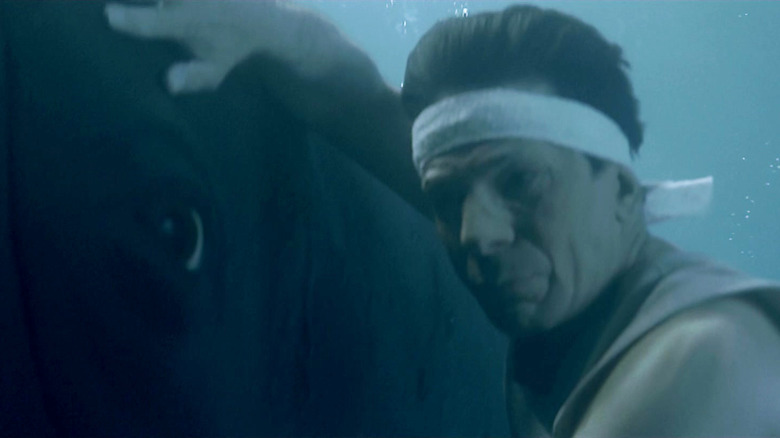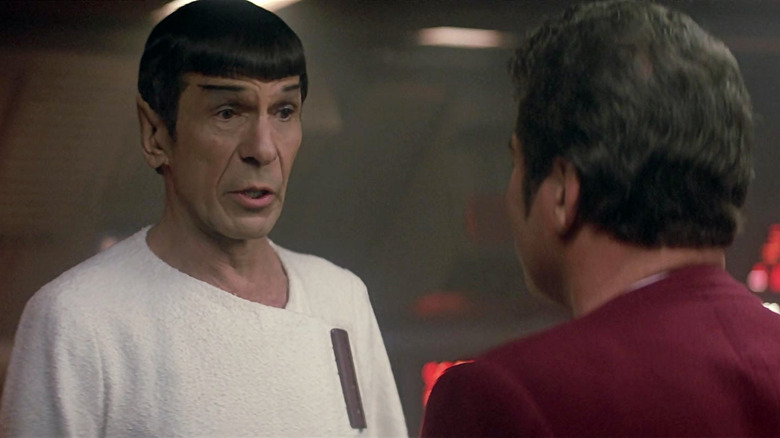Having Leonard Nimoy As Director For Star Trek 4 Caused Some Tension
For every great moment in "Star Trek" history, there seems to be a story of behind-the-scenes turmoil, and for every great "Star Trek" movie, there's one that, based on production stories, seems as if it was always on the verge of falling off the rails entirely. Those that did make it to us arrived thanks to several push-pull partnerships, including a fruitful working relationship between star turned writer-director Leonard Nimoy and producer and writer Harve Bennett.
Though he wasn't involved in the original series, Bennett greatly shaped three "Star Trek" movies, beginning with "Star Trek II: The Wrath of Khan." The late writer-producer came up with early drafts of the script after spotting Ricardo Montalbán's Khan Noonien Singh in the TOS episode "Space Seed." He also worked as an executive producer on the film, and according to both Nimoy's memoir "I Am Spock" and William Shatner's book "Leonard," Bennett single handedly convinced Nimoy to return for the film –- with a plan (sometimes credited to Nimoy himself) to kill off Spock by the time its credits rolled.
Though both Nimoy and Bennett spoke warmly about one another over the years, they were also open about points of contention in their relationship. One major source of tension came during the franchise's fourth film, "Star Trek IV: The Voyage Home," when Nimoy apparently thought Bennett was still treating him with kid gloves despite the fact that he'd proven himself a capable director with "Star Trek III: The Search For Spock."
Writer-producer Harve Bennett kept a close eye on Nimoy
As Bennett told StarTrek.com in 2010, "Leonard didn't have a lot of experience directing, so I spent a lot more time on the set [of 'Search For Spock'] than I would normally have [...] But I think Leonard handled it very well." The second time around, though, the actor-filmmaker was over it. "He got a little more resentful during 'Star Trek IV' because he figured he had proved himself. So we had a little friction there, but we resolved it and he went on to do a magnificent job on 'IV.'" Nimoy didn't dispute this in his own version of events, writing in "I Am Spock" that he "had more confidence after 'Star Trek III,' and therefore was more inclined to hold fast to [his] own opinions." He also noted that the pair were naturally at odds with the film, as Bennett was used to working in television, where producers get the final word.
Hilariously, the pair's friction came to a head over a memo that Nimoy says Bennett sent to Paramount, urging them to okay the crafting of some dialogue for a scene between whales and humans. Nimoy, who shares a "story by" credit with Bennett on the film, had pictured the scene with no subtitles, and appealed to the studio to leave them out. The pair endured several other highs and lows over the years, with Nimoy writing that it was Bennett who first asked him to direct. He also helped Nimoy earn a role in the film "A Woman Called Golda" (seemingly as part of his deal to star in "The Wrath of Khan"), but it was only after Nimoy got to set that he realized Bennett had done so against the wishes of the director.
Despite disagreements, Bennett and Nimoy called one another friends
The pair also clashed about the casting of Commander Kruge (one wanted Christopher Lloyd, the other Edward James Olmos), and at one point in his memoir, Nimoy even asserted that he didn't realize Bennett had added a line in "Wrath of Khan" that could be used to bring Spock back later on. While making "The Search For Spock," he wrote that "a degree of tension existed" between he and Bennett as the latter came to represent the studio's anxiety about having an inexperienced director helming the film. "Harve felt responsible for protecting both the studio and the film just in case I didn't know what I was doing," he wrote in 1995. "He played the role of the studio's vigilant watchdog [...] while I was the dog on the very short leash!"
Still, it's clear that Nimoy saw this only as a role Bennett had to play, and the pair's relationship never reached the level of explosive studio-director conflict making-of documentaries are made of. Nimoy spoke of Bennett as a creative partner elsewhere in the book, complimenting his writing and calling him his "old friend." For his part, Bennett was equally complimentary. "I never understood why Leonard became an actor," he says in Shatner's book "Leonard." He continues: "He is pure intellect [...] very bright, very gifted, and there is something about his non-acting that makes him an authority figure. You put ears on him and it all came together." The pair worked together on three "Trek" films, and when they passed away just two days apart in 2015, obituaries called them "longtime friends."


